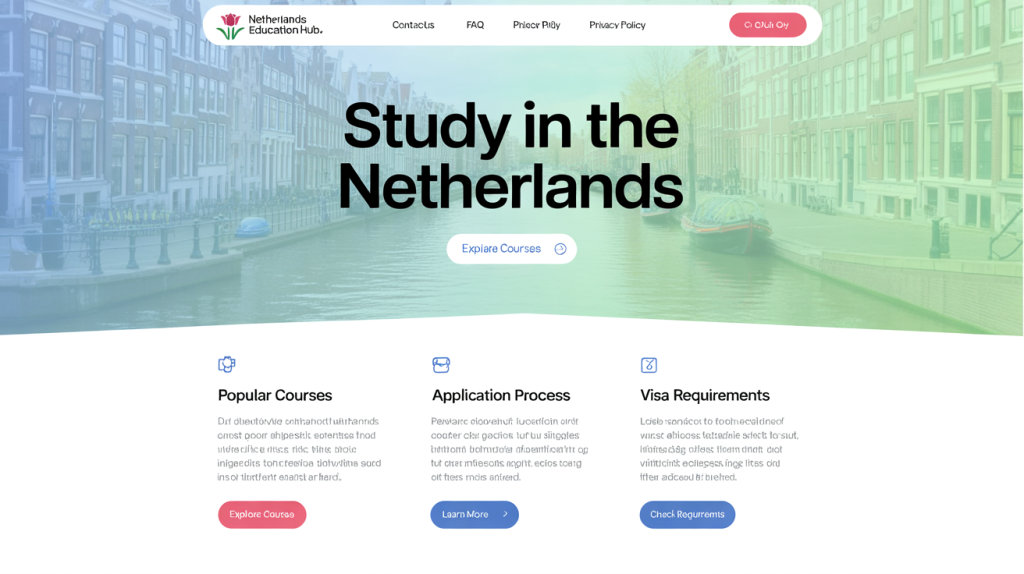A Detailed Guide to Netherlands University Courses: Unlocking Opportunities for International Students
Quick Navigation
- Understanding the Types of Higher Education Institutions in the Netherlands
- Program Structure and Academic Focus
- University Colleges: A Unique Liberal Arts and Sciences Experience
- Why International Students Choose the Netherlands
- How Study in Netherlands Supports International Education Recruitment and Admissions
- Conclusion
- Take the Next Step with Study in Netherlands
Understanding the Types of Higher Education Institutions in the Netherlands
The Dutch higher education system is unique, comprising two central types of institutions that cater to different educational approaches and career orientations.
Research Universities: Academic Excellence and Innovation
Research universities in the Netherlands focus on theoretical knowledge development and research skills. These institutions are renowned for their academic rigor and prepare students for careers in research, academia, and specialized professions.
- Three-year bachelor’s degree programs for most disciplines.
- A total of 13 research universities, with 12 offering English-taught programs, enhancing accessibility for international students.
- Small class sizes to encourage interactive learning and personalized attention.
- Emphasis on independent study, analytical thinking, and scientific research.
They grant a variety of degree qualifications:
- Bachelor of Arts (BA)
- Bachelor of Science (BSc)
- Master of Arts (MA)
- Master of Science (MSc)
- Bachelor of Laws (LLB)
- Master of Laws (LLM)
Universities of Applied Sciences (UAS): Practical and Career-oriented Learning
Universities of Applied Sciences, also known as HBO institutions, offer a distinctly practical education model. They are designed to equip students with the applied skills and hands-on experience required in various professional fields.
- Typical four-year bachelor’s programs that integrate academic theory with professional practice.
- Mandatory work placements, internships, or study abroad opportunities embedded in the curriculum.
- Smaller class sizes promoting direct interaction with faculty and industry mentors.
- Focus on practice-oriented workshops and real-world projects.
These institutions grant degrees often referred to as Applied Science Bachelor’s or the HBO Bachelor’s degree. Popular fields of study encompass:
- Agriculture
- Hotel and Hospitality Management
- Teacher Training
- Process and Food Technology
- International Game Design & Architecture
Program Structure and Academic Focus: What Sets Dutch Universities Apart?
Specialized Education Pathways
In contrast to many other countries where students often explore a broad curriculum across disciplines, Dutch universities prioritize deep specialization. Students mainly engage with courses within their chosen major, ensuring mastery of a specific field. This results in more targeted academic training, which benefits both student learning outcomes and employability.
Flexibility Through Program Options
Despite this specialization, many programs offer flexibility starting from the second year. Students may:
- Further specialize within their major.
- Elect to complete minors in complementary or related fields.
- Participate in academic exchange programs to gain experience at partner universities abroad.
Double Degree Programs: Expanding International Credentials
Many Dutch universities have embraced double, joint, or dual degree programs, enabling students to earn qualifications from two institutions simultaneously. These programs often involve study periods at partner universities across Europe and beyond, fostering intercultural competence and expanding professional networks.
University Colleges: A Unique Liberal Arts and Sciences Experience
University colleges in the Netherlands stand out by offering Liberal Arts and Sciences degrees, a relatively rare structure in European higher education. These institutions provide smaller, multidisciplinary learning communities designed to encourage intellectual exploration and interdisciplinary study.
- Instruction predominantly in English.
- Students apply to the overall Liberal Arts and Sciences program rather than a fixed major initially.
- Once enrolled, students select their major from within the broader curriculum.
- Intimate, discussion-based learning environments that foster critical thinking and creativity.
Why International Students Choose the Netherlands
The Dutch higher education system offers significant benefits that make the Netherlands an ideal study destination:
- English-Taught Programs: Extensive availability of programs in English lowers language barriers for international applicants.
- Value for Money: Competitive tuition fees combined with high living standards provide an excellent return on investment.
- Vibrant International Community: An inclusive environment where students from different cultures thrive.
- Strong Career Prospects: Integration of practical components and internships enhances employability both in the Netherlands and globally.
How Study in Netherlands Supports International Education Recruitment and Admissions
At Study in Netherlands, we understand the nuances of the Dutch higher education sector and provide end-to-end solutions to streamline student recruitment and admissions. Our expertise includes:
- Automated recruitment processes that reduce administrative workload and speed up application handling.
- Comprehensive guidance on university courses in the Netherlands, helping recruiters and agents present detailed, accurate information.
- Targeted marketing strategies that highlight the benefits of studying in the Netherlands, attracting the right candidates.
- Partnership facilitation between universities, recruitment agents, and international students to ensure a seamless admissions experience.
Conclusion: Harnessing the Potential of Netherlands University Courses
The Netherlands’ higher education system—with its dual focus on academic excellence and practical application—provides international students with outstanding opportunities to pursue meaningful, career-oriented degrees. Understanding the differences between research universities, universities of applied sciences, and university colleges enables recruiters and admissions staff to guide students toward programs best suited to their goals.
For agencies and education institutions looking to boost international student enrollment in Dutch programs, collaborating with Study in Netherlands offers a strategic advantage. Leveraging our comprehensive knowledge, recruitment automation solutions, and industry connections will simplify recruitment and ensure students find the right academic paths.
Take the Next Step with Study in Netherlands
Partner with Study in Netherlands to access expert guidance, streamlined admissions technology, and targeted international recruitment campaigns. Contact us today to learn how we can help your institution or agency achieve its recruitment goals and support students in unlocking their academic futures in the Netherlands.

